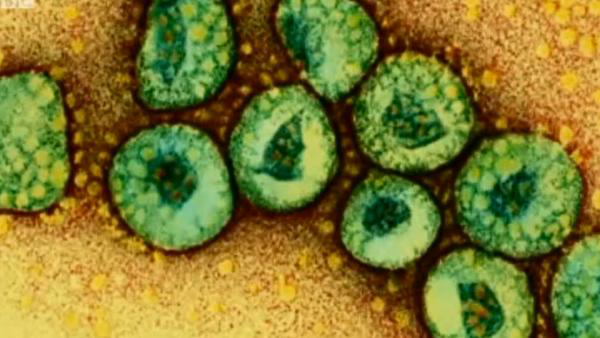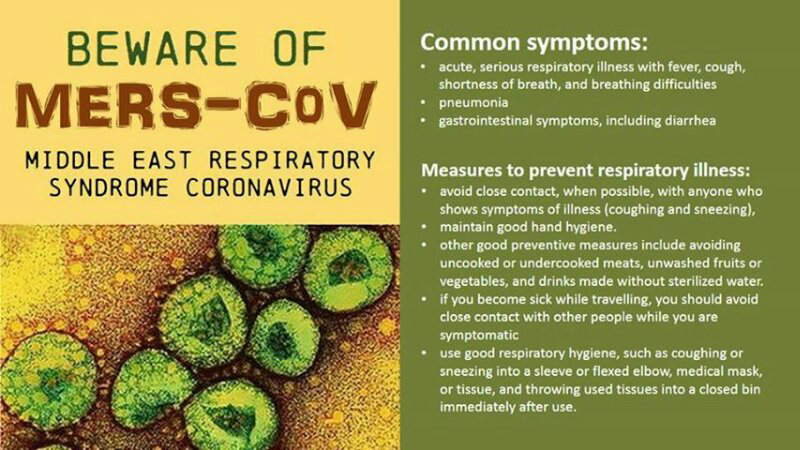Yang dimaksud vaksin mungkin vaksin Flu kali ya...
Middle East Respiratory Syndrome (MERS) - Frequently Asked Questions and Answers
Q: What is MERS?
A: Middle East Respiratory Syndrome (MERS) is a viral respiratory illness. MERS is caused by a coronavirus called “Middle East Respiratory Syndrome Coronavirus” (MERS-CoV)
.
Q: What is MERS-CoV?
A: MERS-CoV is a beta coronavirus. It was first reported in 2012 in Saudi Arabia. MERS-CoV used to be called “novel coronavirus,” or “nCoV”. It is different from other coronaviruses that have been found in people before.
Q: How was the name selected?
A: The Coronavirus Study Group (CSG) of the International Committee on Taxonomy of Viruses (ICTV) decided in May 2013 to call the novel coronavirus “Middle East Respiratory Syndrome Coronavirus” (MERS-CoV)
Q: Is MERS-CoV the same as the SARS virus?
A: No. MERS-CoV is not the same coronavirus that caused severe acute respiratory syndrome (SARS) in 2003. However, like the SARS virus, MERS-CoV is most similar to coronaviruses found in bats. CDC is still learning about MERS.
Q: What are the symptoms of MERS?
A: Most people who got infected with MERS-CoV developed severe acute respiratory illness with symptoms of fever, cough, and shortness of breath. 30% of them died. Some people were reported as having a mild respiratory illness.
Q: Does MERS-CoV spread from person to person?
A: MERS-CoV has been shown to spread between people who are in close contact.[1] Transmission from infected patients to healthcare personnel has also been observed. Clusters of cases in several countries are being investigated.
Q: What is the source of MERS-CoV?
A: We don’t know for certain where the virus came from. However, it likely came from an animal source. In addition to humans, MERS-CoV has been found in camels in Qatar, Egypt and Saudi Arabia, and a bat in Saudi Arabia. Camels in a few other countries have also tested positive for antibodies to MERS-CoV, indicating they were previously infected with MERS-CoV or a closely related virus. However, we don’t know whether camels are the source of the virus. More information is needed to identify the possible role that camels, bats, and other animals may play in the transmission of MERS-CoV.
Q: Is CDC concerned?
A: Yes, CDC is concerned about MERS-CoV. Most people who have been confirmed to have MERS-CoV infection developed severe acute respiratory illness. They had fever, cough, and shortness of breath. About 30% of these people died. Also, in other countries, the virus has spread from person to person through close contact, such as caring for or living with an infected person. CDC recognizes the potential for the virus to spread further and cause more cases globally, including in the United States.
Q: Has anyone in the United States gotten infected?
A: Yes, on May 2, 2014, the first confirmed case of MERS-CoV was reported in a traveler to the United States. This is the only confirmed case in the United States. Read more.
Q: What is CDC doing about the first case of MERS in the United States?
A: CDC works 24/7 to protect people’s health. It is the job of CDC to be concerned and move quickly whenever there is a potential public health problem. CDC is working very quickly to investigate this first U.S. case of MERS and ensure that Americans are safe. We expect to learn much more in the coming hours and days. We will share updated information through this website.
CDC is also closely monitoring the MERS situation globally. We are working with WHO and other partners to better understand the virus, how it spreads, the source, and risks to the public’s health. CDC is engaged in the following ways:
CDC developed molecular diagnostics that will allow scientists to accurately identify MERS cases. CDC also developed assays to detect MERS-CoV antibodies. These lab tests will help scientists tell whether a person is, or has been, infected with MERS-CoV. CDC will evaluate genetic sequences as they are available, which will help scientists further describe the characteristics of MERS-CoV.
As part of routine public health preparedness in the United States, CDC has provided MERS-CoV testing kits to state health departments so they can test for patients under investigation for MERS-CoV infection. CDC also developed Interim Guidance for Health Professionals. This includes case definitions, and guidance for evaluating patients, reporting cases to CDC, infection control in healthcare settings, preparedness, caring for MERS patients at home, and handling clinical specimens.
CDC is offering recommendations to travelers when needed. CDC is also helping to assess ill travelers returning from affected areas.
In addition, CDC has participated in several international public health investigations of MERS. CDC continues to provide advice and laboratory diagnostic support to countries in the Arabian Peninsula and surrounding region.
Q: Am I at risk for MERS-CoV Infection in the United States?
A: You are not considered to be at risk for MERS-CoV infection if you have not had close contact, such as caring for or living with someone who is being evaluated for MERS-CoV infection.
Q: Can I still travel to countries in the Arabian Peninsula or neighboring countries where MERS cases have occurred?
A: Yes. CDC does not recommend that anyone change their travel plans because of MERS. The current CDC travel notice is an Alert (Level 2), which provides special precautions for travelers. Because spread of MERS has occurred in healthcare settings, the alert advises travelers going to countries in or near the Arabian Peninsula to provide health care services to practice CDC’s recommendations for infection control of confirmed or suspected cases and to monitor their health closely. Travelers who are going to the area for other reasons are advised to follow standard precautions, such as hand washing and avoiding contact with people who are ill.
For more information, see CDC’s travel notice on MERS in the Arabian Peninsula.
Q: What if I recently traveled to countries in the Arabian Peninsula or neighboring countries and got sick?
A: If you develop a fever and symptoms of respiratory illness, such as cough or shortness of breath, within 14 days after traveling from countries in the Arabian Peninsula or neighboring countries[2], you should see your healthcare provider and mention your recent travel.
Q: How can I help protect myself?
A: CDC advises that people follow these tips to help prevent respiratory illnesses:
Wash your hands often with soap and water for 20 seconds, and help young children do the same. If soap and water are not available, use an alcohol-based hand sanitizer.
Cover your nose and mouth with a tissue when you cough or sneeze then throw the tissue in the trash.
Avoid touching your eyes, nose, and mouth with unwashed hands.
Avoid close contact, such as kissing, sharing cups, or sharing eating utensils, with sick people.
Clean and disinfect frequently touched surfaces, such as toys and doorknobs.
Q: Is there a vaccine?
A: No, but CDC is discussing with partners the possibility of developing one.
Q: What are the treatments?
A: There are no specific treatments recommended for illnesses caused by MERS-CoV. Medical care is supportive and to help relieve symptoms.
Q: Is there a lab test?
A: Lab tests (polymerase chain reaction or PCR) for MERS-CoV are available at state health departments, CDC, and some international labs. Otherwise, MERS-CoV tests are not routinely available. There are a limited number of commercial tests available, but these are not FDA-approved.
Q: What should healthcare providers and health departments do?
A: For recommendations and guidance on the case definitions; infection control, including personal protective equipment guidance; home care and isolation; case investigation; and specimen collection and shipment, see Interim Guidance for Health Professionals.
Kalo begitu, harus perketat imigrasi...
Orang yang dari daerah travel advice (apalagi travel warning) gak boleh langsung masuk melenggang melewati imigrasi, harus di cek dulu, minimal suhu tubuh
Setidaknya dgn cek suhu tubuh org2 yang baru dari daerah travel advice, kan bs ketahuan kalau lg demam atau nggk yg merupakan salah satu gejala infeksi MERS-CoV itu...
Tapi kalo dari CDC, blm naikin travel advice jadi travel warning sih...
Gmn nggk.... fatality rate nya 90%, bisa dikatakan kalau kena Ebola pasti mati, bahkan diduga Ebola bisa menyebar dengan udara bebas.




 yakin ane 100 % kejadian di medan pasti di hidden
yakin ane 100 % kejadian di medan pasti di hidden 


